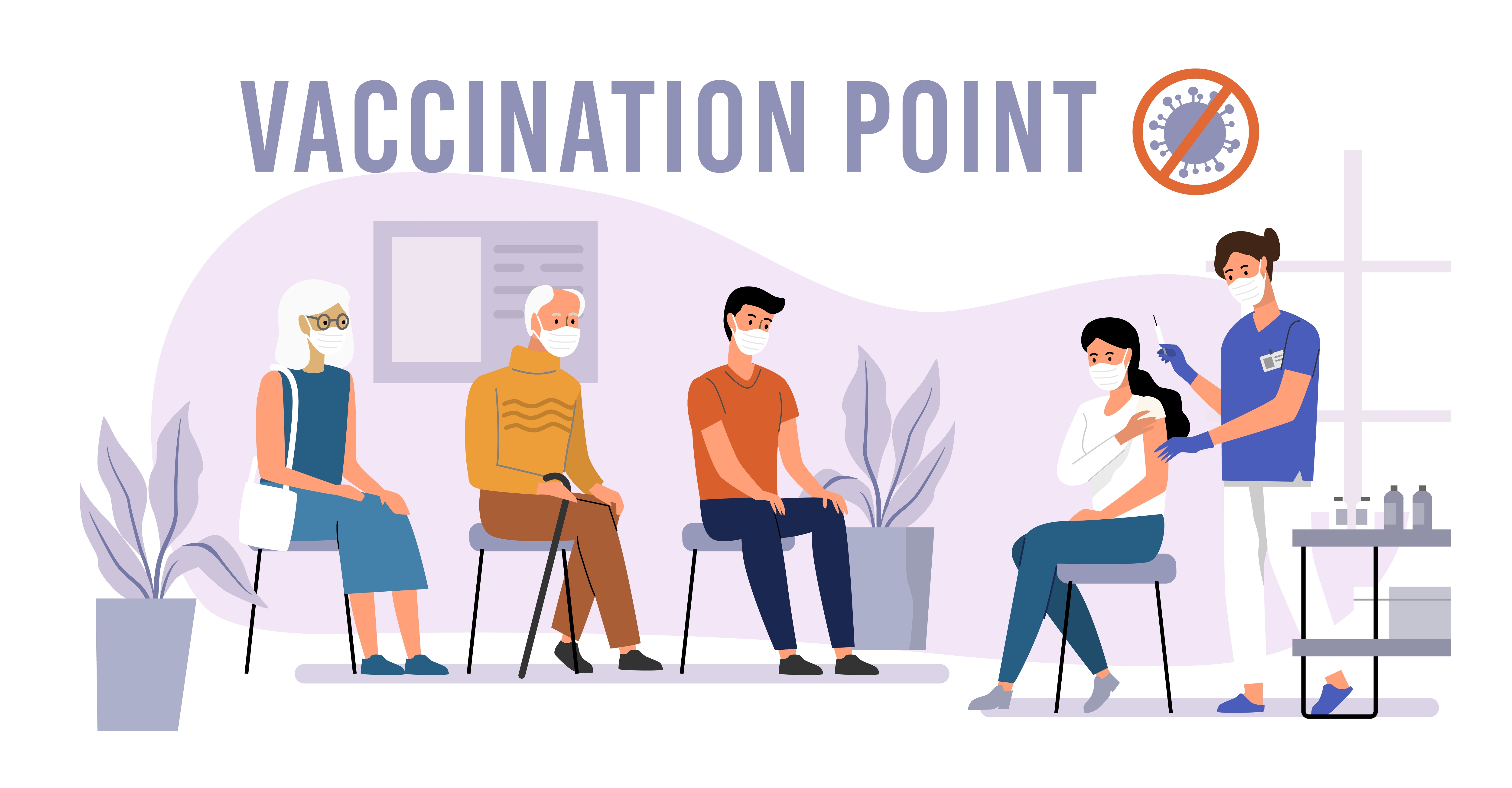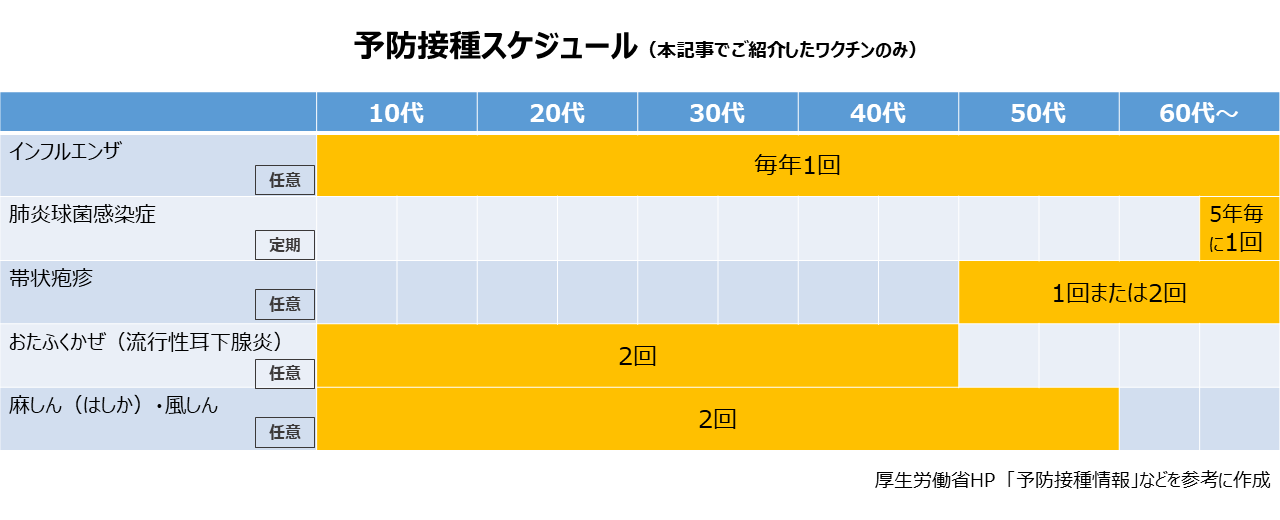
Release date: 2023.09.07
Vaccines are an important means of protecting the health of adults as well as children. Diseases such as influenza, pneumococcal infection, herpes zoster, mumps, measles, and rubella can be effectively prevented by vaccination even for adults. Focusing on VPD (vaccine-preventable disease) in adults, we will summarize the effects of vaccines on them.
It is a seasonal epidemic and highly contagious. Influenza vaccines have the effect of preventing the onset of influenza, reducing the risk of aggravation and complications, and enhancing herd immunity. Influenza vaccines are usually voluntary and you will have to pay the full amount, but elderly people aged 65 and over can receive regular vaccinations at public expense (partially paid by themselves).
Inoculation schedule:
Influenza vaccine (inactivated vaccine, voluntary vaccination)
*However, elderly people aged 65 and over and those aged 60 and over who have a disease are routinely vaccinated)-Once a year
It can cause serious complications such as pneumonia and meningitis. The 23-valent pneumococcal vaccine (PPSV23) can prevent pneumonia caused by 23 types of pneumococci that are particularly frequently infected, and is said to be approximately 30% effective against all pneumococcal pneumonia. It may be especially useful for older adults and people with underlying health conditions. Regular vaccinations are available to people aged 65, 70, 75, 80, 85, 90, 95, and 100 who have not yet been vaccinated with PPSV23, and those aged 60 to under 65 with underlying health conditions.
Inoculation schedule:
13-valent pneumococcal vaccine (inactivated vaccine/optional) - 1 dose for high-risk individuals over 65 and all ages
23-valent pneumococcal vaccine (inactivated vaccine routine) - 1 dose for high-risk persons aged 65 years and older and 60-64 years. Vaccinate every 5 years.
A viral infection caused by the varicella-zoster virus, which causes stabbing pain followed by red spots and small blisters in a band on either side of the body. If it becomes severe, pain may continue for a long time due to postherpetic neuralgia, etc., so caution is required. Antibody rate is 90% among Japanese adults, and the varicella-zoster virus continues to lurk in the body of most adults. Acquired immunity weakens with age, and people over the age of 50 tend to have a higher incidence of shingles. Prevention with herpes zoster vaccine is recommended, and it is said that the risk of developing shingles can be reduced by 50-60% with a live vaccine and more than 90% with an inactivated vaccine. Although it is a voluntary vaccination, people over the age of 50 can receive it, and depending on the local government, it is possible to receive a public subsidy.
Inoculation schedule:
Attenuated varicella vaccine (live vaccine/optional) - 1 dose over 50 years old
Herpes zoster vaccine (inactivated vaccine/optional) - 2 doses over age 50
It is an infectious disease caused by the highly contagious mumps virus and is characterized by swelling of the parotid gland. Adults are more susceptible to severe disease and are at higher risk of complications such as meningitis, encephalitis, pancreatitis, and hearing loss. The World Health Organization (WHO) positions the mumps vaccine as a routine vaccination, just like chickenpox, but in Japan it is an optional vaccine. Many countries have introduced two doses of routine vaccination, and it has been reported that the rate of reduction in the number of onsets after two doses is more than 97%. The mumps vaccine is voluntary, but it is subsidized by some local governments.
Inoculation schedule:
Mumps vaccine (live vaccine/optional) - 2 doses
Measles is an acute febrile exanthema disease caused by the measles virus. The infection route is airborne infection, droplet infection, and contact infection from person to person, and it is characterized by extremely strong infectivity. Almost 100% of infected people who do not have immunity will develop the disease, but acquired immunity is said to last for life. Adults are at high risk of severe disease, and infection during pregnancy may cause miscarriage or premature birth.
Rubella is an acute febrile exanthematous disease caused by the rubella virus, and the main routes of infection are droplet infection and contact infection. Symptoms may become severe when adults are infected, and infection during pregnancy (early pregnancy) in particular increases the risk of congenital rubella syndrome (a disease that causes congenital visual, auditory, and heart disorders) in the fetus. higher.
It is said that more than 95% of people can acquire immunity against measles and rubella by inoculating the MR vaccine. In principle, the national government allows males born between April 2, 1962 to April 1, 1979, who did not have the opportunity to receive routine rubella vaccination as children, to receive an antibody test free of charge. For those who do not have it, we are implementing a system that allows them to receive further vaccinations. Adults who do not meet these conditions are vaccinated voluntarily, but some local governments may provide public subsidies for those who could not receive routine vaccinations, women who wish to become pregnant, and spouses. In addition, although there is an opportunity to measure the antibody titer during pregnancy, caution is required as the MR vaccine cannot be administered during pregnancy even if the antibody titer is low.
Inoculation schedule:
MR vaccine (live vaccine, voluntary vaccination for basic adults) - 2 doses
Voluntary inoculations are generally borne entirely by the patient (sometimes subsidized by public funds), so it is necessary to consult with a doctor, etc., and consider inoculations based on your own risks and health conditions.
Adults, like children, can be prevented from some diseases by vaccination. The effectiveness of vaccines against diseases such as influenza, pneumococcal infection, herpes zoster, mumps, measles, and rubella has been scientifically proven. Vaccination is important to protect the health of individuals and the health of society as a whole.

MEDIUS Group is developing a business centered on the sale of medical equipment. We (Medical + us) involved in medical care also want to play the role of an information source (Media) that delivers useful information for the medical field and people's healthy tomorrow.